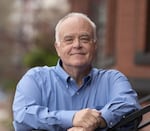The city of Grants Pass has requested that the U.S. Supreme Court consider a case involving the city’s ordinances regulating homelessness. In 2020, a court in Medford ruled those ordinances were unconstitutional because of elements they considered cruel and unusual punishment. The city appealed the decision to the 9th Circuit Court, which upheld it. This summer, a federal appeals court refused to hear the case, which led the city to send its request to the U.S. Supreme Court.
JPR’s Jane Vaughan spoke with Garrett Epps, a professor at the University of Oregon’s School of Law, about the case.

Garrett Epps is a professor at the University of Oregon's School of Law.
Courtesy of Garrett Epps
JPR’s Jane Vaughan: So, the city of Grants Pass has petitioned the U.S. Supreme Court to review this case. Can you tell us about that petition process, and how does the court decide which cases it hears?
Epps: You know, if you look at the Supreme Court’s docket, you can see that there’s extensive briefing by amicus, other cities, state governments, civic groups, and so forth, saying “please take this case, please free us from the Martin precedent.” You will also see a lot of amicus briefs from civil liberties groups, homeless advocacy groups, and so forth saying “no, leave the precedent in place.” Then the issue goes to the court’s conference. And the conference is the most mysterious thing in all of U.S. government. No one but a justice is ever allowed in the room when conference is taking place. What goes on behind those doors is very hard to predict. They discuss any case that any justice thinks is important enough to discuss, then they can vote, and any four justices can put the case down for full argument and hearing and a decision.
Vaughan: And you’ve mentioned the name Martin a couple of times. So that case is Martin v. the City of Boise from 2018, which found that the Eighth Amendment prohibits criminal penalties if someone is sitting, sleeping or lying outside on public property for homeless people who can’t obtain shelter. Can you tell us a little bit about the precedents that have led us to this current case?
Epps: There’s a pretty well established line of cases that says you can’t make it a crime to be something. And states did this, you can’t make it illegal to be a drug addict. You can make it illegal to buy drugs, you can make it illegal to possess them. But the simple status of being addicted can’t be criminalized. The court in the Martin v. the City of Boise case reasoned that being homeless is a status. Obviously, it’s different from being an addict. But how different is the question. Because, you know, if you’re homeless, you could always pick up and go someplace. But what if there’s no place to go? You know, the question, if it goes to the Supreme Court, the question is going to be, “do they have the appetite to extend these so-called status cases?” Or do they want to cut back on Eighth Amendment cases of this kind?
Related: Federal appeals court refuses to rehear Grants Pass homelessness case
Vaughan: And you’ve mentioned this idea of cruel and unusual punishment, which is basically the question that is presented in this case, which is about the enforcement of laws regulating camping on public property. Does that constitute cruel and unusual punishment, which is prohibited by the Eighth Amendment. As you said, if the Supreme Court does decide to hear this case, what sort of implications might there be, particularly for regulating homelessness across the West?
Epps: You can see that cities and counties and governmental bodies from all across the western United States are very interested in getting that precedent off the books. And if you look at what you know of a city like San Francisco, what we know of a city like Portland, there just are so many homeless people, the city is not capable of even building enough shelters. And so the question is, “can we just basically make it impossible for these people to stay?” Does the government simply say, we have no obligation? The “we have no obligation” position is one that this court leans toward in most situations.
Related: How homelessness in Oregon started, grew and became a statewide crisis
Vaughan: Right. So I understand you’re speculating, but do you think the Supreme Court will decide to consider this case or not?
Epps: I think it’s really unlikely the court will not take this case. One of the factors that they’re supposed to consider is the national importance of an issue. And that has been laid out for them pretty clearly. If I had to bet money, I would say that this case will probably be heard, maybe not until next term, but it will receive full treatment from the court. It’s Oz the Great and Terrible. There’s no way to predict what the giant head is going to say because we can’t look behind the curtain.
Related: Here are some solutions to homelessness in Oregon
Vaughan: Okay, great. Well, thank you for speaking with me today.
Epps: Glad to! Enjoyed it. Thanks for the invite.